
| HOME |
| INDEX ARTICLES |
| CONTACT US |
|
Associate Attorney General Thomas Perrelli's Remarks
at Fiftieth Annual Ceremony in Commemoration of Charles J. Bonaparte
U.S. Department Of Justice, June 9, 2010
![]()
Thank you Judge Allegra for that kind introduction.
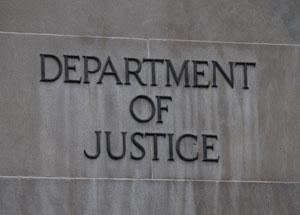 Good afternoon ladies and gentlemen, and welcome to the Department of Justice’s Great Hall. I am truly honored to be here with the Italian Historical Society of America. I should note that there is nothing I havedone since I became the Associate Attorney General that has been of greater interest to my family. At the mention of the Italian Historical Society, my family has been wondering why C-Span isn't carrying this event. I am proud to be with you today, and thank you for making my Aunt Lucia's day.
Good afternoon ladies and gentlemen, and welcome to the Department of Justice’s Great Hall. I am truly honored to be here with the Italian Historical Society of America. I should note that there is nothing I havedone since I became the Associate Attorney General that has been of greater interest to my family. At the mention of the Italian Historical Society, my family has been wondering why C-Span isn't carrying this event. I am proud to be with you today, and thank you for making my Aunt Lucia's day.
The Society and other Italian-American organizations have been honoring Charles Bonaparte for many years. The opportunity to participate in the Society’s 50th annual ceremony commemorating Charles Joseph Bonaparte, a bold man and brilliant lawyer who dedicated his life to serving his country, is a humbling one, and it’s not easy to know what more can be said about him. In a lot of settings, it’s enough for a speaker to be a little bit entertaining and maybe leave folks knowing a little more than they did when they walked in the room. But Charles Bonaparte set a much higher standard. A man who was never lacking in self-confidence, Bonaparte was known to begin a speech by promising that listening to him attentively would make his listeners morally better for having done so.
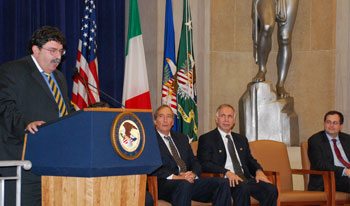
I know better than to make any promise that listening to me will make you morally better. And I lack what we could call Bonaparte’s more “direct” speaking style, as he was known to use whatever platform he was given to give speeches that his admirers have been described as “belligerent[]” and “savage,” and – my favorite, and remember this is from an admirer – relied heavily on language that listeners found “appall[ing].”
So while I can’t promise that I can make anyone here morally better, I can at least promise to try to keep it clean. And although Bonaparte and I may have different speaking styles, we share a common and perhaps unusual heritage – Sicilian and Scottish. Perhaps some day some one will describe me as they described him – “a truly fabulous compound of Sicilian brigand and Scotch bluenose[.]” 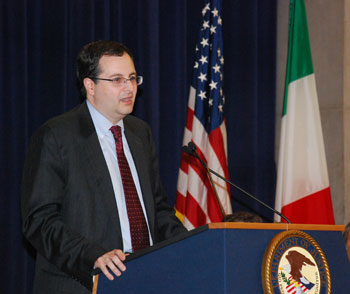
Usually when someone in my job gives a speech, we like to talk about what we’re doing today at the Department of Justice. That’s important, and I hope you’ll indulge me. But I’d like to give something of a different take on my usual speech along these lines. Usually, a talk from someone in my job involves reciting all of the unprecedented steps we’re taking, and the new priorities we’re implementing. Today, I’d like to show how, in many ways, some of the most important efforts we’ve got going aren’t new at all. They’re efforts that were priorities, too, of our 46th Attorney General, Charles Bonaparte.
I’d like to focus on a couple areas in particular.
One of this Administration’s primary law enforcement initiatives is in finding, fighting, and bringing to justice those who profit by defrauding the government and people who are working hard and trying to play by the rules. At the direction of President Obama, we at the Department of Justice have joined with partner agencies all across government, at a federal, state, and local level, to fight back against financial and other forms of fraud. Our Financial Fraud Enforcement Task Force is the broadest coalition of law enforcement, investigatory and regulatory agencies ever assembled to combat fraud. We’re sharing information, coordinating efforts, and multiplying our forces, because people deserve a level playing field.
A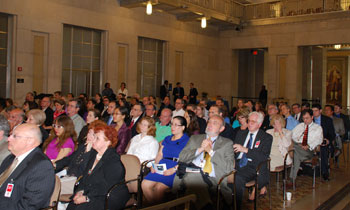 nd those who don’t play by the rules are paying the price. To take one example, from one of our other signature anti-fraud efforts, in September of last year, we entered into the largest health care fraud settlement in the history of the Department of Justice: a $2.3 billion deal with a pharmaceutical company that had tried to profit by breaking the rules.
nd those who don’t play by the rules are paying the price. To take one example, from one of our other signature anti-fraud efforts, in September of last year, we entered into the largest health care fraud settlement in the history of the Department of Justice: a $2.3 billion deal with a pharmaceutical company that had tried to profit by breaking the rules.
Now, you see, I’ve already done it: I’ve touted today’s DOJ as bringing you the broadest fraud-fighting coalition ever, and the biggest health care fraud settlement in history. But let me tell you the truth: We don't have anything on what Charles Bonaparte was doing a century ago.
The economic threats of 1906, when Bonaparte became Attorney General, were the trusts that corporations had formed to restrain competition and keep wages low. Bonaparte insisted on ensuring that ordinary citizens had a chance against the malfeasance of the big institutions, and he initiated several investigations into some of the biggest corporations of the day – from Standard Oil to the American Tobacco Company and the Union Pacific Railroad. 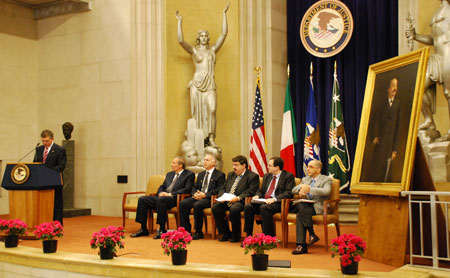
Bonaparte’s reputation was well-known, and as an appointee of Teddy Roosevelt, these interests wouldn’t have surprised anyone. One newspaper saw it right upon Bonaparte’s appointment, and wrote that, “[W]ith his natural hatred of vulgar and greedy rich men” – and remember, Bonaparte himself was quite a patrician – “he will prove a terror to every trust magnate in the country . . . .”
Now, the threats that we’re zeroing in on today with our Financial Fraud Enforcement Task Force aren’t the same as the trusts that Bonaparte had in his sights, but what President Roosevelt saw in Bonaparte’s leadership on these issues sets a legitimate example for us today: Roosevelt wrote to Bonaparte, “You have shown by what you have actually accomplished that the law is enforced against the wealthiest corporation, and the richest and most powerful manager or manipulator of that corporation, just as resolutely and fearlessly as against the humblest citizen.”
What I take from Bonaparte’s work in those days is not that there is any particular joy to be gotten from slaying giants – though you do get the sense that Bonaparte was happy to slay whatever got in his way – but just a basic understanding that the giants have to be subject to the same rules as everybody else. We’re a nation of laws. And when a giant, or anybody else, isn’t following those rules or laws, it is often the Department of Justice’s job to call them to account. 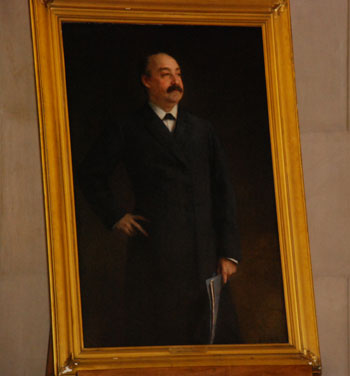
Where did Bonaparte get this? I know one factor is that he had a strong, intelligent New England mother (something I share with him), who instilled in him a distaste for dishonesty and corruption. And from his early days, well before he became Attorney General, he was speaking and writing about corruption and fraud at every chance he got. These were life-long causes. When Bonaparte served on the Maryland Board of Elections Supervisors, he placed watchers at polling places to ensure that ballots remained secret, and along with his colleagues at the Baltimore Reform League, he helped design broad changes to the voting process to deter voter fraud. President Roosevelt brought Bonaparte in as Special Counsel to prosecute corruption and fraud in the postal service – and he was ruthless in his mission. As one Brooklyn reporter described him in a major corruption trial, “Anyone who has sat in the courtroom as we have and watched that Baltimore aristocrat coldly dissect witnesses, will be glad that he never became rich by stealing from the post office.”
Bonaparte’s efforts weren’t going to win him any popularity contests. The postal service investigation led to 46 indictments against 33 people, including political appointees, a state senator, and the secretary of a political party – which is no way to make friends with the powerful. But again, it gets back to the tradition that is at the core of the Justice Department: The men and women who have made this Department part or all of their career do what they do not because it’s popular, or because it will get them thank-you notes. We make our decisions by asking ourselves whether it’s the right thing to do. Bonaparte and Roosevelt understood this, and in fact Bonaparte got a certain kind of perverse recognition for his efforts to clean up Wall Street. Bonaparte wrote a letter to President Roosevelt – apparently the President back then didn’t carry a blackberry – and mentioned that the Wall Street tycoons were smearing him in the press, in an attempt to get rid of him as Attorney General. President Roosevelt wrote back, calling these public complaints a mark of Bonaparte’s success. Roosevelt wrote, “I think the Wall Street people have succeeded in establishing in the minds of the public at large far more effectually than would have been possible for you or myself, the conviction that your course has been such as to cause the gravest alarm to every corrupt man of great wealth.”
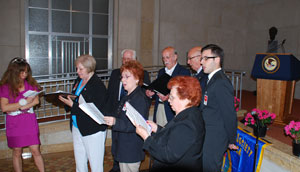
Now, I have said a fair bit about Bonaparte’s vision of what the law, and the Department of Justice, can do to keep us living up to our promise. But Bonaparte took on an even deeper challenge, because he could see that while we might have a legal framework with the right rules, the legal system might not work for a person who couldn’t even get his foot in the door. From the very beginning of Bonaparte’s legal career, he represented litigants who were poor and unable to pay, and yet had claims that he believed were just. He took criminal cases where he believed the defendant was innocent and in need of his help. He represented an Italian-American accused of serious assault, despite the strong anti-Italian feeling during that time, and won an acquittal. At the time of his death, one lawyer said that for Bonaparte, “No call of the helpless or of the wronged ever found him deaf to its appeal, and the more desperate the situation, the more forlorn the client, the more strenuous was his effort and the more unsparing his fight to secure the rights he found jeopardized, or to enforce atonement for injuries inflicted.”
This desire to help the ordinary citizen continues to this day at the Department. Our re-invigorated Civil Rights Division upholds the civil and constitutional rights of all individuals, particularly some of the most vulnerable members of our society. This Division has been instrumental in many of our nation’s battles to advance civil rights, from the desegregation of our nation’s schools to the prosecution of hate crimes, from ensuring girls and women have equal opportunities in schools and the workplace to guaranteeing that individuals with disabilities can access publics services. And the Attorney General’s Access to Justice Initiative, led by Professor Lawrence Tribe, is premised on the understanding that “justice for all” cannot be achieved when the law, courts, and justice are inaccessible to many and often inscrutable to all. The Access to Justice Initiative seeks to improve the availability and quality of indigent defense – an issue the Attorney General has called a “crisis” – and to focus with special care upon the legal needs of the most disadvantaged among us. I think Bonaparte would feel rewarded by how what we are doing here carries forward some of his own work in the legal profession. 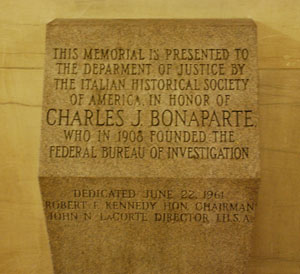
I could go on. I could talk about the Attorney General’s commitment to eliminating politics from any aspect of the civil service hiring system. And you’d respond with stories of Bonaparte’s lifelong crusade to reform the civil service, at all levels of government, with merit-based principles.
I could talk about our own great Attorney General, Eric Holder, and our nominee for Deputy Attorney General, Jim Cole, both of whom came up through the Department’s Public Integrity Section. And you’d remind me of Bonaparte’s great work on public corruption.
And I could talk about how the Attorney General has insisted from day one that the Federal Bureau of Investigation, with all of its new national security missions, be as strong as it ever has in what he has called its traditional law enforcement missions. And you would note that, if you want to talk about the FBI’s traditional missions, you had best start with the man who created it.
I know that this audience already gets the point: With a motto like Inspiratio per Exemplum – inspiration by example – you can see pretty clearly the ways in which today’s Department of Justice is finding an example, an inspiration, in Charles Bonaparte. We like to think that we have learned a fair bit and made some progress since his days, and we are doing our best to carry things forward. But we can learn a lot from our past, and in particular from the career of our 46th Attorney General.
Thank you.
Go to Charles Bonaparte's Home Page
|CiaoAmerica.net|